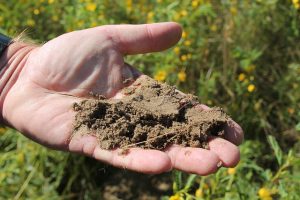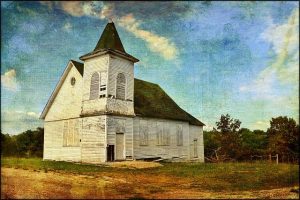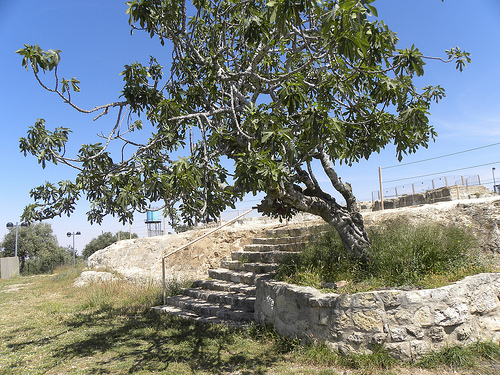Lectionary Reflection for the Third Sunday in Lent
February 28, 2016
Then [Jesus] told this parable: “A man had a fig tree planted in his vineyard; and he came looking for fruit on it and found none. So he said to the gardener, ‘See here! For three years I have come looking for fruit on this fig tree, and still I find none. Cut it down! Why should it be wasting the soil?’ He replied, ‘Sir, let it alone for one more year, until I dig around it and put manure on it. If it bears fruit next year, well and good; but if not, you can cut it down.’” Luke 13:6-9
The world is going crazy for some of the followers of Jesus in this week’s gospel reading. Speculation bordering on gossip seems to be in the air as they relate stories of Pilate’s brutal murder of some Galileans who were worshiping. Their blood had been mixed with the blood of sacrifices. How can this be? Why do such awful things happen? What did they do that would bring about this kind of horrible and shameful death?
Jesus has just finished up setting the crowd straight about the cost of following him and what is required for faithful discipleship, and it appears folks still aren’t getting it. Jesus brings up another top news story–the 18 people in Jerusalem who are killed when a tower fell on and crushed them. There is no difference between the two events, Jesus states. It’s not a matter of degrees of rightness or wrongness, sin or sainthood. Unless  you turn to and rely fully on God, you’re going to die. To drive home the point, he tells a story about a fruitless fig tree, a frustrated man, and a compassionate gardener. The gist of the story? Bear fruit or die. You never know what tomorrow will bring.
you turn to and rely fully on God, you’re going to die. To drive home the point, he tells a story about a fruitless fig tree, a frustrated man, and a compassionate gardener. The gist of the story? Bear fruit or die. You never know what tomorrow will bring.
That’s right. You heard the man. Bear fruit or die. Might that be heard as a stewardship imperative? If we as individual disciples have been given life, then aren’t we responsible for making the most of it? Or, as the poet Mary Oliver asks “Tell me, what is it you plan to do with your one wild and precious life?” Likewise, as the Body of Christ, what are we doing to bear fruit, to bloom where we’ve been planted?
If a congregation is merely existing, longing for an era past, too worn down to invest the energy, creativity, and passion in sharing the Good News of Jesus with a broken and hurting world, then what’s to make it any different from a social club? While our congregations do provide a place to equip disciples and build one another up, the Body of Christ exists to be sent into the world.
Think of it this way; fruit grows outward from the plant into the light. So, too, a healthy church grows outward while still maintaining its deep-rooted connection to Christ. If a congregation is inwardly focused, then its growth is stunted and can fester like an ingrown hair or toenail (not a pretty thought).
We are called to be good stewards of the gifts God has given us–our time, our talent, and our resources. God expects us to be fruitful to the best of our abilities. We are not supposed to be “wasting the soil” forever. Sure, we will have times and seasons when we are less than fruitful in our ministry, mission, worship, and generosity. Even plants and trees have fallow seasons or “manure years” during which they rest and replenish. And, good  gardeners rotate crops and pay attention to the conditions of soil and water and light. They will transplant a tree or shrub if its location is not ideal for successful growth and production.
gardeners rotate crops and pay attention to the conditions of soil and water and light. They will transplant a tree or shrub if its location is not ideal for successful growth and production.
One wonders why the church can’t take a lesson from this story and from the principles of the good steward of land and orchard. Why do we resist change, languish in a fog of scarcity, and pine for the good old days? What keeps us from investing fully in flourishing and taking risks by pruning away the useless and that which chokes and binds us? We do these things to our own peril, and in the process deny our neighbors the opportunity to see Jesus.
Someday, as it was for that barren fig tree, there will be an accounting. For the barren church that means doors closed, windows shuttered, and opportunity lost. No one wants to see that happen to their congregation, right? Or do they? Would they rather be cut down than do the hard work of being pruned, shaped, formed, and nurtured for new life–even if that life looks a whole lot different from the way things have always been?
Yes, why should we be wasting the soil? Where are the figs? Step up the discipleship faith practices and fertilize the folk. Risk it all rather than be cut down. Quit fretting, worrying, counting the miserable pennies and empty pews. There’s a big world out there that needs God’s love. Go. Bloom in the image of Christ.
In Worship
Isaiah 55:2 challenges us today as much as it did God’s people at the time of exile: “Why do you spend your money for that which is not bread, and your labor for that which does not satisfy? Listen carefully to me, and eat what is good, and delight yourselves in rich food?” Consider writing a litany or a confession using this verse. On what do we waste our money that does not truly nourish our bodies, our minds, and our spirits? What is the good food God calls us to eat? For what do we work that does not bring satisfaction? invite congregants to identify one thing that does not truly satisfy to let go of, and one discipleship practice that is “good food” in which to take delight and live.
With Youth
Consider the Old Testament lesson from Isaiah 55. What would it look like to have a feast where people can come and eat at no cost? To come to the waters and have everyone’s thirst quenched? You might lift up the situation with the water in Flint, Michigan. Click here to find a host of articles on the Michigan Public Radio website. What are the justice issues involved? How can we be merciful? How can we prevent this from happening elsewhere? Spend some time reflecting on Isaiah 55:3: “Incline your ear, and come to me; listen, so that you may live. I will make with you an everlasting covenant, my steadfast, sure love for David.” What does this mean for us today? How do we listen to God so that we may live?
With Children
Consider using the Psalm with the children as an action reading. Each verse has some sort of action the children can imitate and follow. You may want to use the Easy to Read Version found here. The psalm is rich with the imagery of God satisfying thirst and hunger, protecting the psalmist. There is also plenty of praise imagery. Remind the children that God is with them at all times: when they are going to sleep at night, in worship, when they are in need (hungry and thirsty or fearful). The psalmist says to “lift up my hands and call on your name.” Invite the children to do that whenever they need to talk to God. Finish with a simple prayer inviting them to lift up their hands to God.
Photos: Ian Scott, USDA NRCS South Dakota, and Keeva999, Creative Commons License. Thanks!)




Helpful article. Thanks for remind me of the Mary Oliver quote!